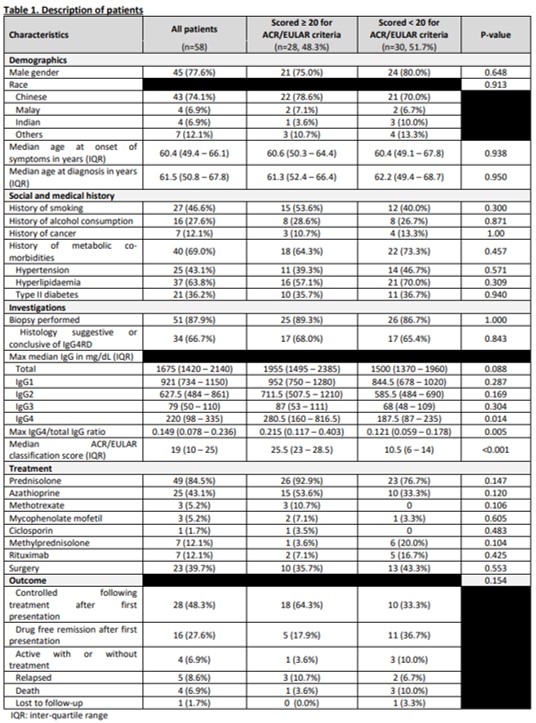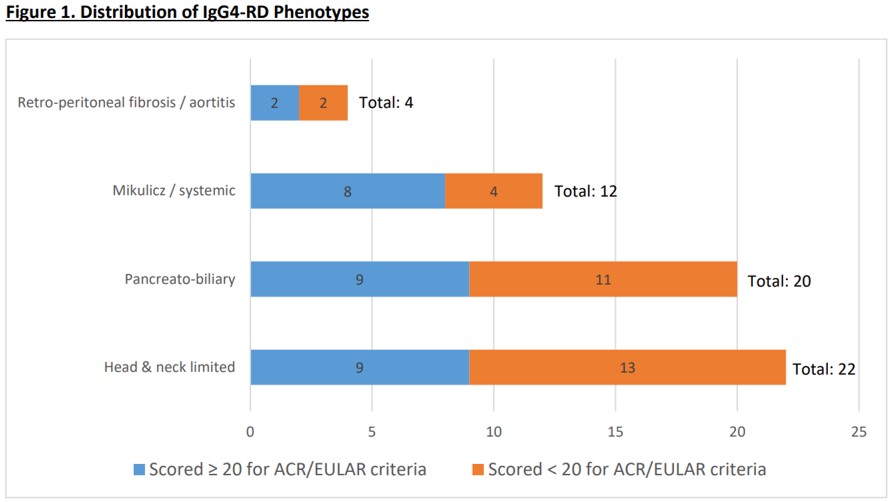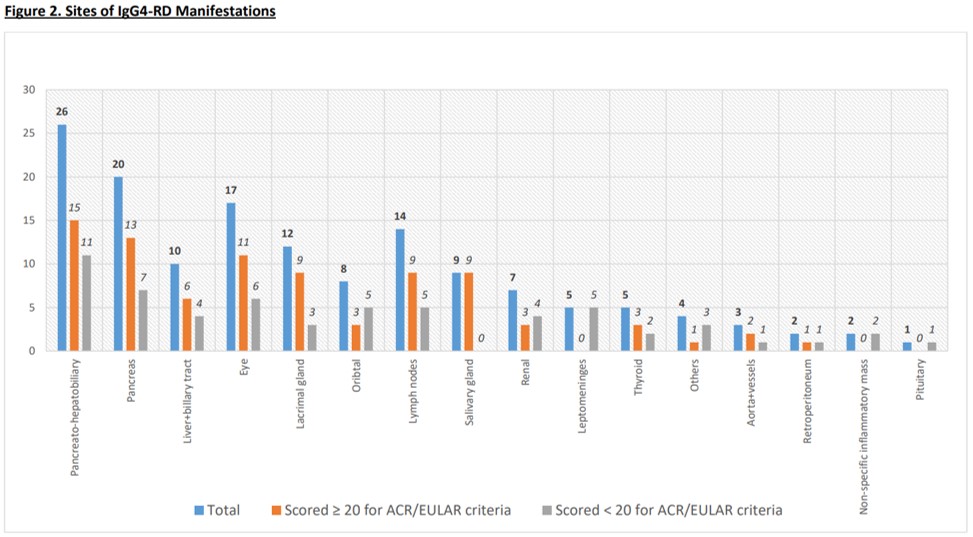Session Information
Date: Monday, November 13, 2023
Title: (1124–1154) Miscellaneous Rheumatic & Inflammatory Diseases Poster II
Session Type: Poster Session B
Session Time: 9:00AM-11:00AM
Background/Purpose: IgG4-related disease (IgG4-RD) is an immune-mediated condition that is heterogenous and can result in organ failure. To understand the disease profile of our local population better, a multi-disciplinary team was formed to review the IgG4-RD patients seen in our hospital.
Methods: A chart review was undertaken for all IgG4-RD patients seen between 1 January 2015 and 30 September 2021 at a major tertiary hospital in Singapore. All patients included fulfilled the 2020 revised comprehensive diagnostic (RCD) criteria for IgG4-RD for at least possible IgG4-RD and then scored according to the 2019 ACR/EULAR classification.
Results: Of the 58 patients included in this study, 28 scored at least 20 (i.e. completely fulfilled) for the 2019 ACR/EULAR classification criteria. 45/58 (77.6%) were male, 43/58 (74.1%) were Chinese, and median age at onset of symptoms and at diagnosis were 60.4 [inter-quartile range (IQR) 49.4-66.1] and 61.5 (IQR 50.8-67.8) years respectively. 27/58 (46.6%) were smokers, 7/58 (12.1%) had cancers, and 40/58 (69.0%) had underlying metabolic co-morbidities. Patients who completely fulfilled the ACR/EULAR classification criteria scored between 21 and 44 (median 25.5), and those who did not fulfil had a score of 4 to 19 (median 10.5). The distribution of clinical phenotypes were: 22/58 (37.9%) head and neck, 20/58 (34.5%) pancreato-biliary, 12/58 (20.7%) Mikulicz/systemic, and 4/58 (6.9%) retro-peritoneal fibrosis/aortitis. The three commonest sites of involvement were pancreato-hepato-biliary 26/58 (44.8%), ocular 17/58 (29.3%) and lymph nodes 14/58 (24.1%). The median maximum serum IgG4 level and median IgG4/total IgG ratio were 220mg/dL (IQR 98-335) and 0.149 (IQR 0.078-0.236) respectively. Patients with Mikulicz/systemic phenotype had significantly higher median total serum IgG, IgG1, IgG2 and IgG3 (p< 0.050). The median maximum serum IgG4 level for those who fulfilled the ACR/EULAR criteria was 280.5mg/dL (IQR 160-816.5) and those who did not fulfil was 187.5mg/dL (87-235) (p=0.014). Histological samples were suggestive/conclusive of IgG4-RD in 68% of patients who completely fulfilled the ACR/EULAR classification criteria and 65.4% of patients who did not (p=0.843). Prednisolone was the commonest treatment prescribed to patients (49/58, 84.5%). Steroid-sparing immunosuppressants were given to 32/58 (55.2%), for which azathioprine was the commonest (25/58, 43.1%) followed by rituximab (7/58, 12.1%). Surgical excision was done in 23/58 (39.7%). 44/58 (75.9%) patients achieved disease remission after first presentation and 16/58 (27.6%) were in drug-free remission. Mortality was 4/58 (6.9%) with one case attributable to complications of IgG4-RD.
Conclusion: The head and neck IgG4-RD phenotype was the commonest one in our cohort, followed by pancreato-biliary. This condition occurred more commonly in males with no gender pre-dilection in any clinical phenotype. The ACR/EULAR classification criteria appeared too restrictive and the 2020 RCD was better able to capture the full spectral of IgG4-RD patients. The overall prognosis for IgG4-RD is good and histological investigation remains important for the diagnosis of this disease.
To cite this abstract in AMA style:
Chua C, Chew W, Kam J, Phua H, Chow C, Ng C, Lim W, Lim R, Gan J, Loh M, Yeo T, Law D, Chan S, Cheang A, Ho Y, Vu C. Clinical Phenotypes of IgG4-related Disease in a Multi-ethnic Singapore Cohort [abstract]. Arthritis Rheumatol. 2023; 75 (suppl 9). https://acrabstracts.org/abstract/clinical-phenotypes-of-igg4-related-disease-in-a-multi-ethnic-singapore-cohort/. Accessed .« Back to ACR Convergence 2023
ACR Meeting Abstracts - https://acrabstracts.org/abstract/clinical-phenotypes-of-igg4-related-disease-in-a-multi-ethnic-singapore-cohort/



